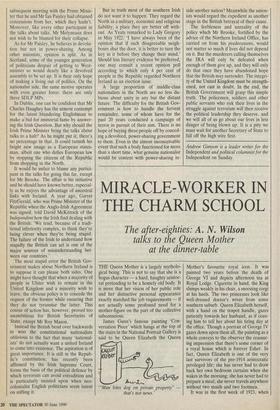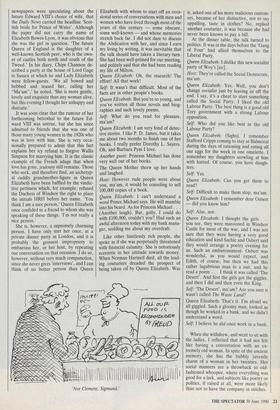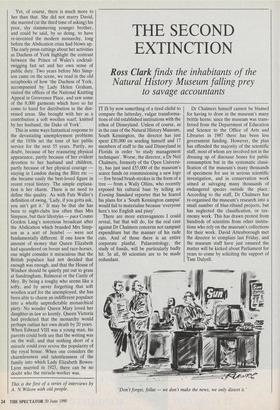MIRACLE-WORKER IN THE CHARM SCHOOL
The after-eighties: A. N. Wilson
talks to the Queen Mother at the dinner-table
THE Queen Mother is a largely mytholo- gical being. This is not to say that she is a bogus character — a hard, haughty aristoc- rat pretending to be a homely old body. It is more that her vision of her public role and her distinctive personal appearance exactly matched the job requirements — if not actually some profound need for a mother-figure on the part of the collective subconscious.
James Gunn's famous painting 'Con- versation Piece' which hangs at the top of the stairs in the National Portrait Gallery is said to be Queen Elizabeth the Queen "'Man bites dog on private property" that's not news.' Mother's favourite royal icon. It was painted two years before the death of George VI and depicts afternoon tea at Royal Lodge. Cigarette in hand, the King slumps weakly in his chair, a snoozing corgi at his heels. The two princesses look like well-dressed doctor's wives from some southern suburb. Queen Elizabeth herself, with a hand on the teapot handle, gazes patiently towards her husband, as if coax- ing him to tell her about his tiring day at the office. Though a portrait of George IV gazes down upon them all, the painting as a whole conveys to the observer the reassur- ing impression that there's some corner of a royal house which is forever Esher. In fact, Queen Elizabeth is one of the very last survivors of the pre-1914 aristocratic privileged life; she has never had to draw back her own bedroom curtains when she wakes in the morning; she has never had to prepare a meal; she never travels anywhere without two maids and two footmen.
It was in the first week of 1923, when newspapers were speculating about the future Edward VIII's choice of wife, that the Daily News carried the headline 'Scot- tish bride for Prince of Wales'. Although the paper did not carry the name of Elizabeth Bowes-Lyon, it was obvious that she was the girl in question. 'The future Queen of England is the daughter of a well-known Scottish peer, who is the own- er of castles both north and south of the Tweed.' In his diary, Chips Channon de- scribed a party at the house of Lord Gage in Sussex at which he and Lady Elizabeth were fellow-guests. 'We all bowed and bobbed and teased her, calling her "Ma'am",' he noted. 'She is more gentle, lovely and exquisite than any woman alive, but this evening I thought her unhappy and distraite.'
It was soon clear that the rumour of her forthcoming betrothal to the future Ed- ward VIII was untrue, but she has since admitted to friends that she was one of those many young women in the 1920s who was in love with him. She is very occa- sionally prepared to admit that this fact explains her icy refusal to forgive Wallis Simpson for marrying him. It is the classic example of the French adage that when love has gone, jealousy still remains. Those who seek, and therefore find, an archetyp- al cuddly grandmother-figure in Queen Elizabeth have been baffled by the vindic- tive pettiness which, for example, refused the Duchess of Windsor the right to place the initials HRH before her name. 'You think I am a nice person,' Queen Elizabeth once confided in a friend to whom she was speaking of these things. 'I'm not really a nice person.'
She is, however, a supremely charming person. I have only met her once, at a private dinner party in London, and it is probably the grossest impropriety to embarrass her, or her host, by repeating our conversation on that occasion. I do so, however, without very much compunction, since she never gives 'interviews', and I can think of no better person than Queen Elizabeth with whom to start off an occa- sional series of conversations with men and women who have lived through most of the years of this century — some obscure, some well-known — and whose memories stretch back far. I did not dare to discuss the Abdication with her, and since I earn my living by writing, it was inevitable that the talk should have taken a literary turn. She had been well-primed for our meeting, and politely said that she had been reading my life of Milton.
Queen Elizabeth: Oh, the research! The effort! All that work!
Self: It wasn't that difficult. Most of the facts are in other people's books.
Queen Elizabeth: But you're so young, and you've written all those novels and biog- raphies and such lovely poems.
Self: What do you read for pleasure, ma'am?
Queen Elizabeth: I am very fond of detec- tive stories. I like P. D. James, but it takes me about two months to finish one of her books. I really prefer Dorothy L. Sayers. Oh, and Barbara Pym I love.
Another guest: Princess Michael has done very well out of her books.
The Queen Mother threw up her hands and laughed.
Host: However rude people were about you, ma'am, it would be consoling to sell 100,000 copies of a book.
Queen Elizabeth: I can't understand a word Prince Michael says. He will mumble into his beard. As for Princess Michael . . . (Another laugh). But, golly, I could do with £100,000, couldn't you? Had such an awful afternoon today with my bank mana- ger, scolding me about my overdraft.
Like other limitlessly rich people, she spoke as if she was perpetually threatened with financial calamity. She is notoriously eccentric in her attitude towards money. When Norman Hartnell died, all the lead- ing couturiers dreaded the prospect of being taken on by Queen Elizabeth. Was 'Not Clement, Sigmund.' it, asked one of his more malicious custom- ers, because of her distinctive, not to say appalling, taste in clothes? No, replied another couturier, it was because she had never been known to pay a bill.
At the dinner table, the talk turned to politics. It was in the days before the 'Gang of Four' had allied themselves to the Liberal Party.
Queen Elizabeth: I dislike this new socialist party of Woy's [sic].
Host: They're called the Social Democrats, ma'am.
Queen Elizabeth: Yes. Well, you don't change socialist just by leaving ist off the end. I say, it's a cheat to start something called the Social Party. I liked the old Labour Party. The best thing is a good old Tory government with a strong Labour opposition.
Self: Who did you like best in the old Labour Party?
Queen Elizabeth: (Sighs). I remember Stafford Cripps coming to stay at Balmoral during the days of rationing and eating all our eggs for the week in one omelette. I remember my daughters scowling at him with hatred. Of course, you have daugh- ters.
Self: Yes.
Queen Elizabeth: Can you get them to read?
Self: Difficult to make them stop, ma'am. Queen Elizabeth: I remember dear Osbert — did you know him?
Self: Alas, not.
Queen Elizabeth: I thought the girls . . . you see, they were marooned in Windsor Castle for most of the war, and I was not sure that they were having a very good education and kind Sachie and Osbert said they would arrange a poetry evening for us. Such an embarrassment. Osbert was wonderful, as you would expect, and Edith, of course, but then we had this rather lugubrious man in a suit, and he read a poem . . . I think it was called 'The Desert'. And first the girls got the giggles, and then I did and then even the King.
Self: 'The Desert', ma'am? Are you sure it wasn't called The Waste Land?
Queen Elizabeth: That's it. I'm afraid we all giggled. Such a gloomy man, looked as though he worked in a bank, and we didn't understand a word.
Self: I believe he did once work in a bank.
When she withdrew, and went to sit with the ladies, I reflected that it had not felt like having a conversation with an ex- tremely old woman. In spite of the ancient memory, she has the bubbly juvenile charm of a woman in her twenties. Her social manners are a throwback to old- fashioned whoopee, where everything was good for a lark, and subjects like poetry or politics, if raised at all, were more likely than not to have the company in stitches. Yet, of course, there is much more to her than that. She did not marry David, she married (at the third time of asking) his poor, shy stammering younger brother, and could be said, by so doing, to have re-invented the modern monarchy, long before the Abdication crisis had blown up. The early press cuttings about her activities as Duchess of York highlight the contrast between the Prince of Wales's cocktail- swigging fast set and her own sense of public duty. Two years before Mrs Simp- son came on the scene, we read in the old scrapbooks of how 'the Duchess of York, accompanied by Lady Helen Graham, visited the offices of the National Knitting Appeal in Grosvenor Place, and saw some of the 8,000 garments which have so far come to hand for distribution in the dist- ressed areas. She brought with her as a contribution a soft woollen scarf, knitted by her husband, the Duke of York'.
This in some ways fantastical response to the devastating unemployment problems of the 1930s set the tone of her public service for the next 55 years. Partly, no doubt, because of her reassuring physical appearance, partly because of her evident devotion to her husband and children, partly because of her physical courage staying in London during the Blitz etc she became easily the best-loved figure in recent royal history. The simple explana- tion is her charm. There is no need to define this quality. As with Fats Waller's definition of swing, 'Lady, if you gotta ask, you ain't got it.' It may be that she has been to night-clubs less often than Mrs Simpson, but their lifestyles — pace Cosmo Gordon Lang's notorious broadcast after the Abdication which branded Mrs Simp- son as a sort of Jezebel — were not fundamentally different. If one knew the amount of money that Queen Elizabeth had squandered on booze and race-horses, one might consider it miraculous that the British populace had not decided that enough was enough, and that the House of Windsor should be quietly put out to grass at Sandringham, Balmoral or the Castle of Mey. By being a toughy who seems like a softy, and by never forgetting that soft woollen scarf for the unemployed, she has been able to charm an indifferent populace into a wholly unpredictable monarchical piety. No wonder Queen Mary loved her daughter-in-law so keenly. Queen Victoria had predicted that the monarchy would perhaps outlast her own death by 20 years. When Edward VIII was a young man, his parents could both see that the writing was on the wall, and that nothing short of a miracle could ever revive the popularity of the royal house. When one considers the charmlessness and talentlessness of the family into which Lady Elizabeth Bowes- Lyon married in 1923, there can be no doubt who the miracle-worker was.
This is the first of a series of interviews by A. N. Wilson with old people.




























































 Previous page
Previous page